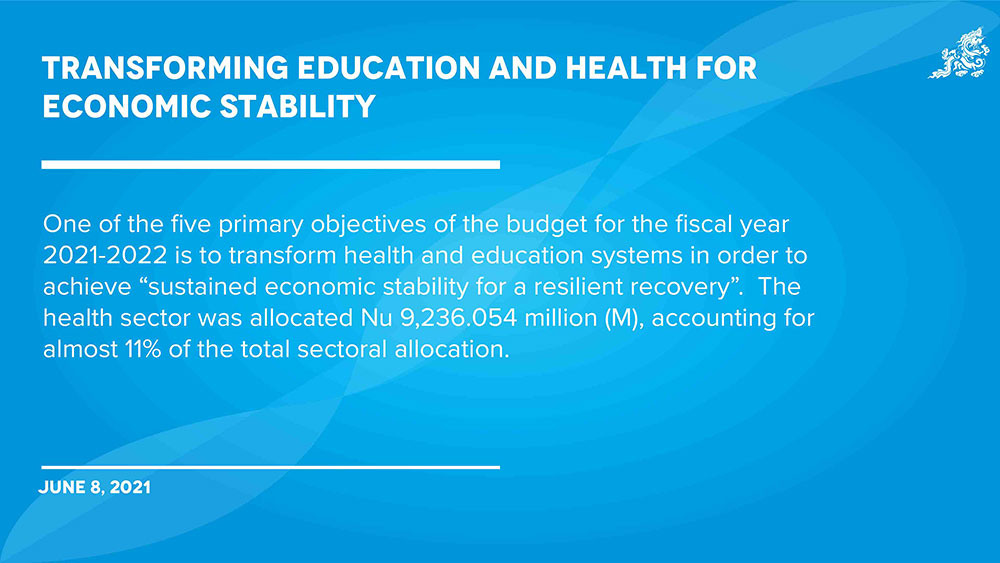Transforming health and education system is one of the five broad objectives to ensure “sustained economic stability for a resilient recovery” of the budget for the financial year 2021-2022.
Considering the severe health risk posed by the second wave of Covid-19 and with the coverage of the first dose of Oxford-AstraZeneca vaccine, the health sector is given a total budget allocation of Nu 9,236.054 million (M), constituting about 11 percent of the total sectorial allocation.
This is in order to implement effective containment measures to mitigate the risk of community transmission, to provide a second dose of vaccine to the eligible population, and emphasise the surveillance, early detection, control and prevention, response and recovery from the outbreak in the country.
Of the total, Nu 3,330.735M including the health flagship programme (Nu 484.652M) is provisioned under the health ministry apart from Nu 1,000M the government has earmarked to meet Covid-19-related expenses.
The major activities would include procurement of drugs and non-drugs, medical equipment, and development of health infrastructures such as additional hospital wing at the referral hospital, construction of 40-bedded district hospital at Dewathang, Samdrupjongkhar, and construction of 65-bedded mother and child hospital in Mongar.
The flagship activities include gastric, cervical, and breast cancer. The sector allocation also includes budget for local government to execute health infrastructures.
The government has postponed the accelerated mother and child health programme. However, considering the importance of the programme, the government will explore the possibility of implementing the programme based on the improvement of revenue performance during the year.
In order to build education resilience to the pandemic and to continue providing education to all children, the education ministry is provided Nu 15,288.063M for the financial year 2021-2022. This constitutes 19 percent of the total allocation. The ministry has also developed and implemented a curriculum for education in emergency.
Of the total sector allocation, Nu 151.00M is for education flagship to support ICT laboratory, procurement of computers and LAN equipment for the establishment of laboratory in the schools.
The budget report stated that other activities include ICT skills and knowledge development for students to prepare them for a tech-driven and knowledge-based economy.
“Besides the flagship programs other activities are school infrastructure developments, government scholarships to class XI and XII students in private schools, undergraduate scholarships, and capacity development for the universities.”
As part of the education reform, the ministry has also piloted the curriculum of The Royal Academy (TRA) in two schools Wangbama Central School and Dechencholing Higher Secondary School.
This initiative will be replicated in 22 schools in the next financial year for which a budget of Nu 68M has been provisioned. A budget of Nu 336M is allocated with respective dzongkhags and thromdes for procurement of school stationaries.
Meanwhile, to ensure that the capital budget is provided only for critical and Covid-19 related activities, the government has deferred all new constructions and rationalised all activities under training.
It includes activities like workshops, seminar, training, orientation, annual conference, observation of international days, awareness programmes, and hiring of consultancies, research, and survey.
By Yangchen C Rinzin
Edited by Jigme Wangchuk


